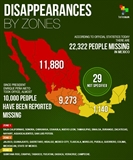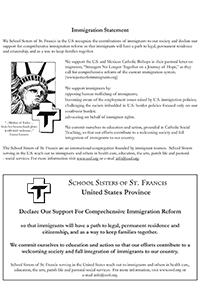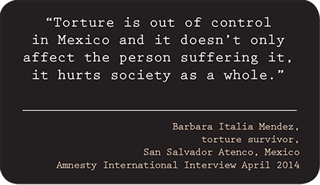 What is Enforced Disappearance?
What is Enforced Disappearance?
Article 2 of the International Convention for the Protection of All Persons from Enforced Disappearance, defines enforced disappearance as:
“The arrest, detention, abduction or any other form of deprivation of liberty by agents of the State or by persons or groups of persons acting with the authorization, support or acquiescence of the State, followed by a refusal to acknowledge the deprivation of liberty or by concealment of the fate or whereabouts of the disappeared person, which place such a person outside the protection of the law.”
Other Resources
Mexico in a State of Crisis
by Sister Arlene Woelfel, OSF
The following reflection is a brief commentary about the gravity of the situation in Mexico. Sister Arlene accompanies families of the disappeared and victims of torture at the Human Rights Center Paso del Norte in Juárez, Mexico.
Historical Background of Enforced Disappearance in Mexico
by María De Vecchi Gerli
Remarks presented at the panel: The Struggle for a Better Life: A Context for Understanding the Enforced Disappearance of Rural Students in Guerrero, MexicoUCL, Institute of the Americas, 15th October, 2014
A Surge of Immigrants Continue to Arrive at the U.S.-Mexican Border
 In August of 2014 there was an unprecedented number of “family units” and unaccompanied minors presenting themselves at the U.S.-Mexican border. They were seeking asylum to escape the violence, extortion, extreme poverty and lack of employment in their countries. After several months, the numbers of people coming to the border lessened until this September, 2015. Again we have thousands of Central Americans and Mexicans seeking asylum here in our country. The violence has not diminished nor have the other push factors which force people to leave their land. A new problem is the drought in Guatemala and consequently no corn harvest which has literally brought about starvation in some parts of this country.
In August of 2014 there was an unprecedented number of “family units” and unaccompanied minors presenting themselves at the U.S.-Mexican border. They were seeking asylum to escape the violence, extortion, extreme poverty and lack of employment in their countries. After several months, the numbers of people coming to the border lessened until this September, 2015. Again we have thousands of Central Americans and Mexicans seeking asylum here in our country. The violence has not diminished nor have the other push factors which force people to leave their land. A new problem is the drought in Guatemala and consequently no corn harvest which has literally brought about starvation in some parts of this country.
In the El Paso, Texas area, U.S. Border Patrol has apprehended 690 family units and 571 unaccompanied minors from October 1 until November 30 of 2015. We had only one shelter in the city of El Paso to receive the “family units”; however, the shelter received 250 immigrants in one week so another shelter was opened. Due to the need for more volunteers, Ruben Garcia called on Religious Women’s Communities to help. Sisters from all over the U.S. are coming for a month or two to provide assistance at the shelters. The immigrants need clothes, food, medical assistance, toiletries, and rides to the bus station or airport. These shelters have assisted the government in housing many of the new immigrant families that cannot be detained at an Immigration Customs Enforcement detention facilities.
The people of El Paso have been extremely generous in donating their time, talent and money for this project and we, the School Sisters of St. Francis, have been offering our services and financial aid, through donations, to alleviate the desperation of the people seeking refuge in our country.
Torture in Mexico: Widespread and Persistent
 Torture and other cruel and degrading treatment also play a central role in policing and public security operations by military and police forces across Mexico. The Human Rights Center Paso de Norte in Juárez, Mexico has taken an active stance against torture by defending people unjustly arrested, tortured, and accused of serious crimes. In 2014, the Center was successful in achieving the release of 11 young men, two of whom were minors. Their stories are described in the September 2014 report of Amnesty International, “Out of Control.”
Torture and other cruel and degrading treatment also play a central role in policing and public security operations by military and police forces across Mexico. The Human Rights Center Paso de Norte in Juárez, Mexico has taken an active stance against torture by defending people unjustly arrested, tortured, and accused of serious crimes. In 2014, the Center was successful in achieving the release of 11 young men, two of whom were minors. Their stories are described in the September 2014 report of Amnesty International, “Out of Control.”
The exoneration from charges and release from prison is the first phase in a long process of recuperation. Most of the men experience various degrees of post traumatic stress and require psychological accompaniment. Center staff, the survivors and their families are working to deepen their understanding of what it means to “repair the damage” in psychological, economic, political, and moral terms. This will require several years of on-going work by Center staff with the survivors and their families. It will include litigation to hold the perpetrators of torture accountable for their acts. And what is true for the people of Juárez is true for all of Mexico!
In the face of such atrocities, the people of Mexico are calling for a transformation within their country. We Franciscan sisters stand in solidarity with them by accompanying families who have loved ones that have disappeared and the survivors of torture and their families. We maintain a loving, non-violent presence that seeks to support the families of the disappeared and the survivors of torture so they can develop the strength and courage to continue the search for their loved ones and prod the government to assume its responsibility as a defender of human rights.